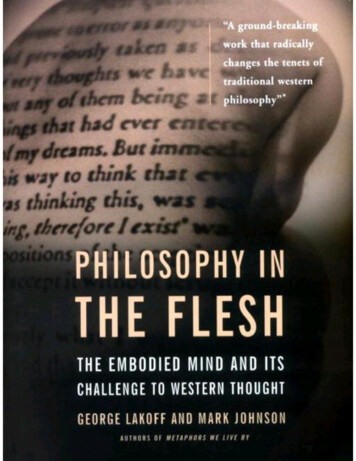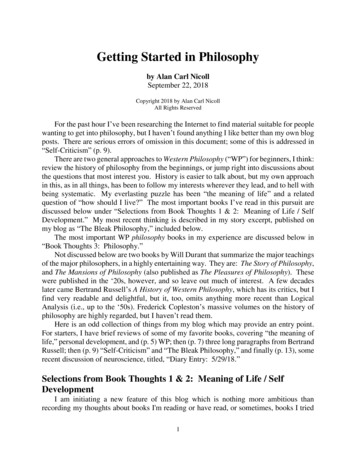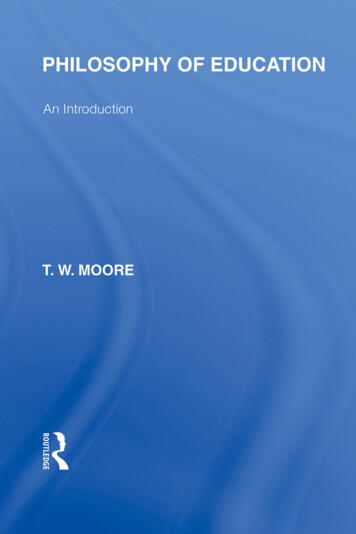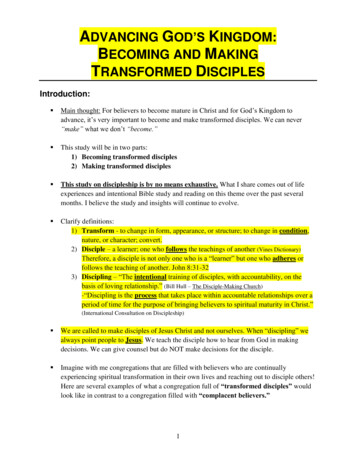
Transcription
Philosophy in the Flesh
Philosophy inthe FleshTHE EMBODIED MIND ANDITS CHALLENGE TOWESTERN THOUGHTGeorge Lakoff and Mark JohnsonFor Three generations of Lakoffs Herman, Sandy, and Andyand for Sandra McMorris Johnson
ContentsAcknowledgments ixA Note on the References XIIIPart IHOW THE EMBODIED MIND CHALLENGES THE WESTERN PHILOSOPHICAL TRADITIONi Introduction: Who Are We? 32 The Cognitive Unconscious 93 The Embodied Mind 164 Primary Metaphor and Subjective Experience 455 The Anatomy of Complex Metaphor 6o6 Embodied Realism: Cognitive Science Versus A Priori Philosophy 747 Realism and Truth 948 Metaphor and Truth 118Part IITHE COGNITIVE SCIENCE OF BASIC PHILOSOPHICAL IDEAS9 The Cognitive Science of Philosophical Ideas 133io Time I37i Events and Causes 117012 The Mind 23 513 The Self z6714 Morality 29oPart It tTHE COGNITIVE SCIENCE OF PHILOSOPHY115 The Cognitive Science of Philosophy 337
r6 The Pre-Socratics: the Cognitive Science of Early Greek Metaphysics 34617 Plato 36418 Aristotle 373iy Descartes and the Enlightenment Mind 39120 Kantian Morality 411521 Analytic Philosophy 44022 Chomsky's Philosophy and Cognitive Linguistics 46923 The Theory of Rational Action 511324 How Philosophical Theories Work 539Part IVEMBODIED PHILOSOPHY25 Philosophy in the Flesh 551Appendix: The Neural Theory of Language Paradigm 569References 584Index 603
Acknowledgmentsn undertaking of this scope would not be possible without a great deal of help. Ourstudents and colleagues at Berkeley and at Oregon L have contributed immeasurably to thiswork, and we would like to thank them, as well as other friends who have gone out of their wayto help in this enterprise.Claudia Baracchi, Thomas Alexander, David Barton, and Robert Hahn helped us greatly toappreciate the subtleties of Greek philosophy and provided valuable assistance with Chapters16, 17, and 18.Rick Grush, Michele Emanatian, and Tim Rohrer read and gave extensive comments onvarious drafts of the manuscript as a whole.Eve Sweetser was involved in the project from the beginning and has made innumerablesuggestions and contributions over the years. Her groundbreaking research on the metaphors formind laid the foundation for the study presented in Chapter 12.Jerome Feldman's definitive contributions to the neural theory of language helped lay thefoundations for the approach to the embodiment of mind that is central to this work. In addition,we have benefited immensely from his detailed suggestions on various drafts of the manuscript.Robert Powell went above and beyond the call of collegiality and friendship in helping towork out the mathematical details of rational action in Chapter 23.Joseph Grady's investigations into the experiential basis of metaphor played a major role inthe theory presented in this book, as did Srini Narayanan's neural theory of metaphor, whichmeshed perfectly with Grady's results.Jane Espenson spent more than a year researching the metaphorical structure of causationbefore leaving Berkeley for a writing career in Hollywood.None of this work would have been possible without the development of cognitive linguisticsas a discipline. Our debt to those who have defined the discipline is both immense and evidentthroughout the entire project. In particular, our gratitude goes to Ron Langacker, Leonard Talmy,Gilles Fauconnier, Eve Sweetser, Charles Fillmore, Mark Turner, Claudia Brugman, AdeleGoldberg, and Alan Cienki.We owe a special debt to Evan Thompson, Francisco Varela, and Eleanor Rosch, whoseextensive work on embodied cognition has been inspirational and has informed our thinkingthroughout.
In addition, many students and colleagues have made analytic suggestions and contributedunpublished research that has greatly enriched this work. We would like to recognize theircontributions, chapter by chapter.Chapter 3, The Embodied Mind and Appendix: Jerome Feldman, Terry Regier, David Bailey,and Srini Narayanan.Chapter 10, Time: Rafael Nunez, Kevin Moore, Jeong-Woon Park, Mark Turner, and JohnRobert Ross.Chapter 11, Events and Causes: Jane Espenson, Karin Myhre, Sharon Fischlet, ClaudiaBrugman, Adele Goldberg, Sarah Taub, and Tim Rohrer.Chapter 12, The Mind: Eve Sweetser, Alan Schwartz, Michele Emanatian, and GyorgyLaszlo.Chapter 13, The Self: Miles Becker, Andrew Lakoff, Yukio Hirose, and Bart Wisialowski.Chapter 14, Morality: Bruce Buchanan, Sarah Taub, Chris Klingehiel, and Tim Adamson.We also extend our deepest thanks to others who have helped in various ways: RobertAdcock, David Abram, Michael Barzelay, David Collier, Owen Flanagan, David Galin,Christopher Johnson, Dan Jurafsky, Jean-Pierre Koenig, Tony Leiserowitz, Robert McCauley,James D. McCawley, Laura Michaelis, Pamela Morgan, Charlene Spretnak, and Lionel Wee.We would also like to thank all the participants in seminars we have held on philosophy andcognitive science at Berkeley and at Oregon, as well as the participants in our seminar at the1996 Berkeley Summer Institute. We are indebted to several anonymous readers whosecomments made this a much better book.We are especially grateful for the diligent copyediting of Ann Moru and the editorial guidanceof William Frucht.Our wives, Kathleen Frumkin and Sandi Johnson, have not only provided support above andbeyond the call of duty with their love and abundant pa tience extending over many years, buthave also given us regular and invaluable feedback on our ideas.We would especially like to express our gratitude for the privilege of working in theextraordinary intellectual communities at the University of California at Berkeley and theUniversity of Oregon at Eugene. We owe a particular debt to the Institute for Cognitive Studiesand the International Computer Science Institute at Berkeley.Finally, we want to honor the two greatest philosophers of the embodied mind. Any book withthe words "philosophy" and "flesh" in the title must express its obvious debt to MauriceMerleau-Ponty. He used the word "flesh" for our primordial embodied experience and sought tofocus the attention of philosophy on what he called "the flesh of the world," the world as we feel
it by living in it. John Dewey, no less than Merleau-Ponty, saw that our bodily experience is theprimal basis for everything we can mean, think, know, and communicate. He understood the fullrichness, complexity, and philosophical importance of bodily experience. For their day, Deweyand Merleau-Ponty were models of what we will refer to as "empirically responsiblephilosophers." They drew upon the best available empirical psychology, physiology, andneuroscience to shape their philosophical thinking.
A Note on the Referencesn citing the many sources we used in preparing this book, we have departed somewhat fromthe familiar author-date reference system by arranging the sources into subject categories. Eachcitation begins with a capitalized letter and a number (or sometimes just a letter) keyed to itslocation in the reference list. For example, our book Metaphors We Live By is cited in the textas (Al, Lakoff and Johnson 1980). This tells readers that the full listing can be found in sectionAl of the references, "Metaphor Theory." We have done this to make it easier to find specificreferences and also to provide a helpful start for readers who want to dig deeper into theliterature on particular topics.Here is a complete list of the subject categories:A. Cognitive Science and Cognitive LinguisticsA 1. Metaphor TheoryA2. Experimental Studies in MetaphorA3. Metaphor in Gesture and American Sign LanguageA4. CategorizationAS. ColorA6. FramingA7. Mental Spaces and Conceptual BlendingA8. Cognitive Grammar and Image SchemasA9. Discourse and PragmaticsA10. Decision Theory: The Heuristics and Biases ApproachB. Neuroscience and Neural ModelingB1. Basic NeuroscienceB2. Structured Connectionist ModelingC. Philosophy
C1. Cognitive Science and Moral PhilosophyC2. Philosophical SourcesD. Other LinguisticsE. Miscellaneous
Part I
How the Embodied MindChallenges the WesternPhilosophical Tradition
introduction:Who Are We?How Cognitive Science Reopens Central Philosophical QuestionsThe mind is inherently embodied.Thought is mostly unconscious.Abstract concepts are largely metaphorical.These are three major findings of cognitive science. More than two millennia of a prioriphilosophical speculation about these aspects of reason are over. Because of these discoveries,philosophy can never be the same again.When taken together and considered in detail, these three findings from the science of the mindare inconsistent with central parts of Western philosophy. They require a thorough rethinking ofthe most popular current approaches, namely, Anglo-American analytic philosophy andpostmodernist philosophy.This book asks: What would happen if we started with these empirical discoveries about thenature of mind and constructed philosophy anew? The answer is that an empirically responsiblephilosophy would require our culture to abandon some of its deepest philosophical assumptions.This hook is an extensive study of what many of those changes would be in detail.Our understanding of what the mind is matters deeply. Our most basic philosophical beliefsare tied inextricably to our view of reason. Reason has been taken for over two millennia as thedefining characteristic of human beings. Reason includes not only our capacity for logicalinference, but also our ability to conduct inquiry, to solve problems, to evaluate, to criticize, todeliberate about how we should act, and to reach an understanding of ourselves, other people,and the world. A radical change in our understanding of reason is therefore a radical change inour understanding of ourselves. It is surprising to discover, on the basis of empirical research,that human rationality is not at all what the Western philosophical tradition has held it to be. Butit is shocking to discover that we are very different from what our philosophical tradition hastold us we are.Let us start with the changes in our understanding of reason: Reason is not disembodied, as the tradition has largely held, but arises from the nature of ourbrains, bodies, and bodily experience. This is not just the innocuous and obvious claim that weneed a body to reason; rather, it is the striking claim that the very structure of reason itself comesfrom the details of our embodiment. The same neural and cognitive mechanisms that allow us toperceive and move around also create our conceptual systems and modes of reason. Thus, tounderstand reason we must understand the details of our visual system, our motor system, and the
general mechanisms of neural binding. In summary, reason is not, in any way, a transcendentfeature of the universe or of disembodied mind. Instead, it is shaped crucially by thepeculiarities of our human bodies, by the remarkable details of the neural structure of our brains,and by the specifics of our everyday functioning in the world. Reason is evolutionary, in that abstract reason builds on and makes use of forms of perceptualand motor inference present in "lower" animals. The result is a Darwinism of reason, a rationalDarwinism: Reason, even in its most abstract form, makes use of, rather than transcends, ouranimal nature. The discovery that reason is evolutionary utterly changes our relation to otheranimals and changes our conception of human beings as uniquely rational. Reason is thus not anessence that separates us from other animals; rather, it places us on a continuum with them. Reason is not "universal" in the transcendent sense; that is, it is not part of the structure of theuniverse. It is universal, however, in that it is a capacity shared universally by all human beings.What allows it to be shared are the commonalities that exist in the way our minds are embodied. Reason is not completely conscious, but mostly unconscious. Reason is not purely literal, but largely metaphorical and imaginative. Reason is not dispassionate, but emotionally engaged.This shift in our understanding of reason is of vast proportions, and it entails a correspondingshift in our understanding of what we are as human beings. What we now know about the mind isradically at odds with the major classical philosophical views of what a person is.For example, there is no Cartesian dualistic person, with a mind separate from andindependent of the body, sharing exactly the same disembodied transcendent reason witheveryone else, and capable of knowing everything about his or her mind simply by selfreflection. Rather, the mind is inherently embodied, reason is shaped by the body, and since mostthought is unconscious, the mind cannot be known simply by self-reflection. Empirical study isnecessary.There exists no Kantian radically autonomous person, with absolute freedom and atranscendent reason that correctly dictates what is and isn't moral. Reason, arising from thebody, doesn't transcend the body. What universal aspects of reason there are arise from thecommonalities of our bodies and brains and the environments we inhabit. The existence of theseuniversals does not imply that reason transcends the body. Moreover, since conceptual systemsvary significantly, reason is not entirely universal.Since reason is shaped by the body, it is not radically free, because the possible humanconceptual systems and the possible forms of reason are limited. In addition, once we havelearned a conceptual system, it is neurally instantiated in our brains and we are not free to thinkjust anything. Hence, we have no absolute freedom in Kant's sense, no full autonomy. There is noa priori, purely philosophical basis for a universal concept of morality and no transcendent,
universal pure reason that could give rise to universal moral laws.The utilitarian person, for whom rationality is economic rationality-the maximization ofutility-does not exist. Real human beings are not, for the most part, in conscious control of-oreven consciously aware of-their reasoning. Most of their reason, besides, is based on variouskinds of prototypes, framings, and metaphors. People seldom engage in a form of economicreason that could maximize utility.The phenomenological person, who through phenomenological introspection alone candiscover everything there is to know about the mind and the nature of experience, is a fiction.Although we can have a theory of a vast, rapidly and automatically operating cognitiveunconscious, we have no direct conscious access to its operation and therefore to most of ourthought. Phenomenological reflection, though valuable in revealing the structure of experience,must be supplemented by empirical research into the cognitive unconscious.There is no poststructuralist person-no completely decentered subject for whom all meaningis arbitrary, totally relative, and purely historically contin gent, unconstrained by body and brain.The mind is not merely embodied, but embodied in such a way that our conceptual systems drawlargely upon the commonalities of our bodies and of the environments we live in. The result isthat much of a person's conceptual system is either universal or widespread across languagesand cultures. Our conceptual systems are not totally relative and not merely a matter of historicalcontingency, even though a degree of conceptual relativity does exist and even though historicalcontingency does matter a great deal. The grounding of our conceptual systems in sharedembodiment and bodily experience creates a largely centered self, but not a monolithic self.There exists no Fregean person-as posed by analytic philosophy-for whom thought has beenextruded from the body. That is, there is no real person whose embodiment plays no role inmeaning, whose meaning is purely objective and defined by the external world, and whoselanguage can fit the external world with no significant role played by mind, brain, or body.Because our conceptual systems grow out of our bodies, meaning is grounded in and through ourbodies. Because a vast range of our concepts are metaphorical, meaning is not entirely literaland the classical correspondence theory of truth is false. The correspondence theory holds thatstatements are true or false objectively, depending on how they map directly onto the worldindependent of any human understanding of either the statement or the world. On the contrary,truth is mediated by embodied understanding and imagination. That does not mean that truth ispurely subjective or that there is no stable truth. Rather, our common embodiment allows forcommon, stable truths.There is no such thing as a computational person, whose mind is like computer software, ableto work on any suitable computer or neural hardwarewhose mind somehow derives meaningfrom taking meaningless symbols as input, manipulating them by rule, and giving meaninglesssymbols as output. Real people have embodied minds whose conceptual systems arise from, areshaped by, and are given meaning through living human bodies. The neural structures of ourbrains produce conceptual systems and linguistic structures that cannot be adequately accounted
for by formal systems that only manipulate symbols.Finally, there is no Chomskyan person, for whom language is pure syntax, pure form insulatedfrom and independent of all meaning, context, perception, emotion, memory, attention, action,and the dynamic nature of communication. Moreover, human language is not a totally geneticinnovation. Rather, central aspects of language arise evolutionarily from sensory, motor, andother neural systems that are present in "lower" animals.Classical philosophical conceptions of the person have stirred our imaginations and taught usa great deal. But once we understand the importance of the cognitive unconscious, theembodiment of mind, and metaphorical thought, we can never go back to a priori philosophizingabout mind and language or to philosophical ideas of what a person is that are inconsistent withwhat we are learning about the mind.Given our new understanding of the mind, the question of what a human being is arises for usanew in the most urgent way.Asking Philosophical Questions Requires Using Human ReasonIf we are going to ask philosophical questions, we have to remember that we are human. Ashuman beings, we have no special access to any form of purely objective or transcendent reason.We must necessarily use common human cognitive and neural mechanisms. Because most of ourthought is unconscious, a priori philosophizing provides no privileged direct access toknowledge of our own mind and how our experience is constituted.In asking philosophical questions, we use a reason shaped by the body, a cognitiveunconscious to which we have no direct access, and metaphorical thought of which we arelargely unaware. The fact that abstract thought is mostly metaphorical means that answers tophilosophical questions have always been, and always will be, mostly metaphorical. In itself,that is neither good nor bad. It is simply a fact about the capacities of the human mind. But it hasmajor consequences for every aspect of philosophy. Metaphorical thought is the principal toolthat makes philosophical insight possible and that constrains the forms that philosophy can take.Philosophical reflection, uninformed by cognitive science, did not discover, establish, andinvestigate the details of the fundamental aspects of mind we will be discussing. Some insightfulphilosophers did notice some of these phenomena, but lacked the empirical methodology toestablish the validity of these results and to study them in fine detail. Without empiricalconfirmation, these facts about the mind did not find their way into the philosophical mainstream.Jointly, the cognitive unconscious, the embodiment of mind, and metaphorical thought requirenot only a new way of understanding reason and the nature of a person. They also require a newunderstanding of one of the most common and natural of human activities-asking philosophicalquestions.What Goes into Asking and Answering Philosophical Questions?
If you're going to reopen basic philosophical issues, here's the minimum you have to do. First,you need a method of investigation. Second, you have to use that method to understand basicphilosophical concepts. Third, you have to apply that method to previous philosophies tounderstand what they are about and what makes them hang together. And fourth, you have to usethat method to ask the big questions: What it is to be a person? What is morality? How do weunderstand the causal structure of the universe? And so on.This book takes a small first step in each of these areas, with the intent of giving an overviewof the enterprise of rethinking what philosophy can become. The methods we use come fromcognitive science and cognitive linguistics. We discuss these methods in Part I of the book.In Part II, we study the cognitive science of basic philosophical ideas. That is, we use thesemethods to analyze certain basic concepts that any approach to philosophy must address, such astime, events, causation, the mind, the self, and morality.In Part III, we begin the study of philosophy itself from the perspective of cognitive science.We apply these analytic methods to important moments in the history of philosophy: Greekmetaphysics, including the pre-Socratics, Plato, and Aristotle; Descartes's theory of mind andEnlightenment faculty psychology; Kant's moral theory; and analytic philosophy. These methods,we argue, lead to new and deep insights into these great intellectual edifices. They help usunderstand those philosophies and explain why, despite their fundamental differences, they haveeach seemed intuitive to many people over the centuries. We also take up issues in contemporaryphilosophy, linguistics, and the social sciences, in particular, Anglo-American analyticphilosophy, Chomskyan linguistics, and the rational-actor model used in economics and foreignpolicy.Finally, in Part IV, we summarize what we have learned in the course of this inquiry aboutwhat human beings are and about the human condition.What emerges is a philosophy close to the hone. A philosophical perspective based on ourempirical understanding of the embodiment of mind is a philosophy in the flesh, a philosophythat takes account of what we most basically are and can be.
I.
The Cognitive Unconsciousiving a human life is a philosophical endeavor. Every thought we have, every decisionwe make, and every act we perform is based upon philosophical assumptions so numerous wecouldn't possibly list them all. We go around armed with a host of presuppositions about what isreal, what counts as knowledge, how the mind works, who we are, and how we should act. Suchquestions, which arise out of our daily concerns, form the basic subject matter of philosophy:metaphysics, epistemology, philosophy of mind, ethics, and so on.Metaphysics, for example, is a fancy name for our concern with what is real. Traditionalmetaphysics asks questions that sound esoteric: What is essence? What is causation? What istime? What is the self? But in everyday terms there is nothing esoteric about such questions.Take our concern with morality. Does morality consist of a set of absolute moral laws thatcome from universal reason? Or is it a cultural construct? Or neither? Are there unchanginguniversal moral values? Where does morality come from? Is it part of the essence of what it is tobe a human being? Is there an essence of what it is to be a human being? And what, exactly, is anessence anyway?Causation might appear to be another esoteric topic that only a philosopher could care about.But our moral and political commitments and actions presuppose implicit views on whetherthere are social causes and, if so, what they might be. Whenever we attribute moral or socialresponsibility, we are implicitly assuming the possibility of causation, as well as very specificnotions of what a cause is.Or take the self. Asking about the nature of the self might seem to be the ultimate in esotericmetaphysical speculation. But we cannot get through a day without relying on unconsciousconceptions of the internal structure of the self. Have you taken a good look at yourself recently?Are you trying to find your "true self"? Are you in control of yourself? Do you have a hidden selfthat you are trying to protect or that is so awful you don't want anyone to know about it? If youhave ever considered any matters of this sort, you have been relying on unconscious models ofwhat a self is, and you could hardly live a life of any introspection at all without doing so.Though we are only occasionally aware of it, we are all metaphysicians-not in some ivorytower sense but as part of our everyday capacity to make sense of our experience. It is throughour conceptual systems that we are able to make sense of everyday life, and our everydaymetaphysics is embodied in those conceptual systems.The Cognitive Unconscious
Cognitive science is the scientific discipline that studies conceptual systems. It is a relativelynew discipline, having been founded in the 1970s. Yet in a short time it has made startlingdiscoveries. It has discovered, first of all, that most of our thought is unconscious, not in theFreudian sense of being repressed, but in the sense that it operates beneath the level of cognitiveawareness, inaccessible to consciousness and operating too quickly to be focused on.Consider, for example, all that is going on below the level of conscious awareness when youare in a conversation. Here is only a small part of what you are doing, second by second:Accessing memories relevant to what is being saidComprehending a stream of sound as being language, dividing it into distinctive phoneticfeatures and segments, identifying phonemes, and grouping them into morphemesAssigning a structure to the sentence in accord with the vast number of grammaticalconstructions in your native languagePicking out words and giving them meanings appropriate to contextMaking semantic and pragmatic sense of the sentences as a wholeFraming what is said in terms relevant to the discussionPerforming inferences relevant to what is being discussedConstructing mental images where relevant and inspecting themFilling in gaps in the discourseNoticing and interpreting your interlocutor's body languageAnticipating where the conversation is goingPlanning what to say in responseCognitive scientists have shown experimentally that to understand even the simplest utterance,we must perform these and other incredibly complex forms of thought automatically and withoutnoticeable effort below the level of consciousness. It is not merely that we occasionally do notnotice these processes; rather, they are inaccessible to conscious awareness and control.When we understand all that constitutes the cognitive unconscious, our understanding of thenature of consciousness is vastly enlarged. Consciousness goes way beyond mere awareness ofsomething, beyond the mere experience of qualia (the qualitative senses of, for example, pain orcolor), beyond the awareness that you are aware, and beyond the multiple takes on immediateexperience provided by various centers of the brain. Consciousness certainly involves all of theabove plus the immeasurably vaster constitutive framework provided by the cognitive
unconscious, which must be operating for us to be aware of anything at all.Why "Cognitive" Unconscious?The term cognitive has two very different meanings, which can sometimes create confusion. Incognitive science, the term cognitive is used for any kind of mental operation or structure thatcan be studied in precise terms. Most of these structures and operations have been found to beunconscious. Thus, visual processing falls under the cognitive, as does auditory processing.Obviously, neither of these is conscious, since we are not and could not possibly be aware ofeach of the neural processes involved in the vastly complicated total process that gives rise toconscious visual and auditory experience. Memory and attention fall under the cognitive. Allaspects of thought and language, conscious or unconscious, are thus cognitive. This includesphonology, grammar, conceptual systems, the mental lexicon, and all unconscious inferences ofany sort. Mental imagery, emotions, and the conception of motor operations have also beenstudied from such a cognitive perspective. And neural modeling of any cognitive operation isalso part of cognitive science.Confusion sometimes arises because the term cognitive is often used in a very different way incertain philosophical traditions. For philosophers in these traditions, cognitive means onlyconceptual or propositional structure. It also includes rule-governed operations on suchconceptual and propositional structures. Moreover, cognitive meaning is seen as truthconditional meaning, that is, meaning defined not internally in the mind or body, but by referenceto things in the external world. Most of what we will be calling the cognitive unconscious is thusfor many philosophers not considered cognitive at all.As is the practice in cognitive science, we will use the term cognitive in the richest possiblesense, to describe any mental operations and structures that are involved in language, meaning,perception, conceptual systems, and reason. Because our conceptual systems and our reasonarise from our bodies, we will also use the term cognitive for aspects of our sensorimotorsystem that contribute to our abilities to conceptualize and to reason. Since cognitive operationsare largely unconscious, the term cognitive unconscious accurately describes all unconsciousmental operations concerned with conceptual systems, meaning, inference, and language.The Hidden Hand That Shapes Conscious ThoughtThe very existence of the cognitive unconscious, a fact fundamental to all conceptions ofcognitive science, has important implications for the practice of philosophy. It m
THE COGNITIVE SCIENCE OF BASIC PHILOSOPHICAL IDEAS 9 The Cognitive Science of Philosophical Ideas 133 io Time I37 i Events and Causes 1170 12 The Mind 23 5 13 The Self z67 14 Morality 29o Part It t THE COGNITIVE SCIENCE OF PHILOSOPHY 115 The










